Researchers found a quick and efficient method for reprogramming fibroblasts, which are the cells that make up scar tissue, to become healthy cardiac muscle cells in the study, the findings of which were published in the journal “Stem Cells”.
In the event of a heart attack or muscle disease, the fibroblasts typically generate hard tissue that results in heart failure.
The work employs a protein called Ascl1, which controls gene activity, to transform this tough tissue into cardiac muscle cells. Ascl1 was previously believed to be unique to neurons.
In order to document and evaluate changes in the cells’ genetic activity patterns and variables affecting gene activity during these three reprogramming processes, the scientists used three ways to convert mouse fibroblasts into heart muscle cells, liver cells, and neurons.
The scientists discovered that the protein Ascl1 activates a set of cardiomyocyte genes when fibroblasts are reprogrammed into neurons.
To investigate what would happen, the researchers combined the three transcription factors they had previously employed to create cardiomyocytes with the cardiomyocyte genes they had previously activated.
The discovery that it greatly boosted reprogramming efficiency—the percentage of successfully reprogrammed cells—by more than 10-fold astounded the experts.
They found that they could now preserve only Ascl1 and another transcription factor known as Mef2c, eliminating two of the three components from their initial mixture.
According to main study author Li Qian, a professor in the Department of Pathology at the University of North Carolina, the discovery “is predicted to be valuable in creating future cardiac therapies and other potential types of therapeutic cellular reprogramming.”
“Doctors will be able to reprogramme the harmful cells into good cells in patients with a straightforward injection,” Qian added.
He added that the reprogramming process is successful because Ascl1 and Mef2c combine to provide supporting effects on cardiomyocytes that none of the two factors can have on their own.
In order to mend sick hearts, the researchers plan to create a synthetic protein that combines the active components of Ascl1 and Mef2c.
Researchers find a protein that can heal damaged hearts.

